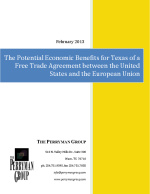The Potential Economic Benefits for Texas of a Free Trade Agreement between the United States and the European Union
Published on February 16, 2013

Import and export activity is an essential aspect of optimizing economic performance. By allowing each nation to focus resources on those goods and services where it has a competitive advantage and import other products, foreign trade helps improve business conditions and quality of life around the globe.
From the beginnings of such exchanges centuries ago, there have been tariffs, quotas, and other impediments to free trade. Over time, many of these have been eliminated through free trade agreements. It is a widely accepted economic principle that free trade is beneficial from both the import and the export side, and additional efforts to enhance exchange are worthy of consideration. While the world has become highly integrated and complex, with extensive intra-industry trade in addition to that between sectors, the basic principles remain in place.
The Perryman Group was recently asked to examine the potential impact of a transatlantic free trade agreement between the United States and the European Union on business activity in Texas. This analysis reveals that the state would likely see the addition of between approximately $9 billion in economic output and more than 89,600 jobs from a US-EU free trade agreement, with additional potential gains stemming from productivity enhancements and efforts to eliminate non-tariff barriers to trade.
For more details please refer to the full report.